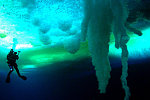 Shadows off the beaten path
Shadows off the beaten pathSOUNDS LIKE TEEN SPIRIT | WRANGLER: ANATOMY OF AN ICON
< < D O C S > >
last update 27.Apr.09
See also: SHADOWS FILM FESTIVAL
 R E V I E W B Y R I C H C L I N E
R E V I E W B Y R I C H C L I N E MUST
MUST  SEE
SEE
narr Werner Herzog
with David Ainley, Samuel S Bowser, Ashrita Furman, Peter Gorham, William Jirsa, Karen Joyce, Henry Kaiser, William McIntosh, Clive Oppenheimer, David R Pacheco Jr, Stefan Pashov, Libor Zicha

release US 11.Jun.08,
UK 24.Apr.09
08/US Discovery 1h39
TORONTO FILM FEST
 Only Herzog would take this approach to a documentary about Antarctica, exploring what kind of nutcase chooses to live in such an isolated place. It takes one to know one, clearly, and this film is sheer bliss on screen.
Only Herzog would take this approach to a documentary about Antarctica, exploring what kind of nutcase chooses to live in such an isolated place. It takes one to know one, clearly, and this film is sheer bliss on screen.
Somewhat surprised that he's allowed to visit even though he's not making a film about penguins, Herzog travels by military transport to McMurdo, where some 1,000 live and work through a five-month summer in which the sun never sets. He's surprised to find an ugly, muddy mining town ("I wasn't expecting living in harmony with fluffy penguins"), and sets out to meet the offbeat residents. He also signs up for survival training and sends his cameras beneath the ice for a spectacular view from underneath. And yes, he visits a penguin colony, capturing it in a way that only Herzog could.
Using crisp high-def cinematography, Herzog infects us with his curiosity, peering into this isolated community while cleverly weaving in the history of the continent (including some stunning century-old footage). Best of all are the faces of the people he meets, which he shoots in ways that are clever and often hilarious, such as the biologist (Bowser) talking about the monstrous, sci-fi nature of the under-ice world while a gigantic red diving suit looms behind him. Or the computer expert (Joyce) who must be stopped from telling another long story.
Herzog finds something amazing in everyone. The mechanic Zicha escaped from the Eastern Bloc and keeps his rucksack packed at all times, just in case. Pacheco is a gentle-giant plumber who sees his Aztec/Apache heritage in his royal-shaped hands. Ainley prefers the company of penguins to humans. It's such remarkably personal filmmaking that we're only barely aware how much we're learning about the planet and society along the way.
This is a fascinating, funny, riveting look at a community of "professional dreamers". It's loaded with telling detail and quietly brilliant observations. And it powerfully makes the point that, in our efforts to preserve endangered species, we are ignoring the fact that human languages and cultures are becoming extinct every day. And our reliance on technology makes us extremely vulnerable to nature. It's an ode to humanity on the edge. And it's absolutely unmissable.
27.Dec.08
 R E V I E W B Y R I C H C L I N E
R E V I E W B Y R I C H C L I N E
with Richard Berkowitz, Joseph Sonnabend, Larry Kramer, Edmund White, Sean Strub, Michael Lucas, Gabriel Rotello, Richard Dworkin, Francisco Roque, Krishna Stone, Don Adler, Ardele Lister
 release UK Oct.08 lff,
release UK Oct.08 lff, US 12.Jun.09
08/US 1h15


 This fascinating, straightforward doc looks at a chapter of North America's Aids story that's rarely been told. It's also an important account of one person who ruffled feathers in his attempt to do the right thing.
This fascinating, straightforward doc looks at a chapter of North America's Aids story that's rarely been told. It's also an important account of one person who ruffled feathers in his attempt to do the right thing.
In the early 1980s, when people were struggling to respond to (or just ignoring) the emergence of Aids, Richard Berkowitz was a young New York rentboy with a radically different perspective: with musician Michael Callen and virologist Joseph Sonnabend, he declared that the gay community needed to address its promiscuity and have safer sex. No one wanted to hear this, and harsh criticism was levelled both at their theory and Richard's dodgy personal life. But they tenaciously continued to speak out.
Filmmaker Wein throws us into the epicentre of this period, when these three men matter-of-factly said the unthinkable. In 1982, the idea of using condoms for anything beyond avoiding pregnancy was considered to be a ludicrous infringement on personal freedom. And celibacy or monogamy simply weren't considered options for gay men. On screen, Berkowitz and Sonnabend (Callen died in 1993) talk candidly about how they declared war on promiscuity. Berkowitz also openly discusses his own personal journey, including the details of his tawdry past.
Meanwhile, other interviewees add information, texture and emotion. Kramer talks about how he watched 18 close friends die within a year, then had to listen to the likes of Pat Buchanan opine that gay men deserved what they got. Even as Sonnabend isolates a toxic lifestyle as the cause of the disease's rapid spread, it's impossible to make simplistic statements about such a complicated illness. And the yawning silence of the Reagan government only made things worse
It's an extremely well-assembled documentary, smoothly edited in a smart, straightforward style. Wein is careful to back up everything with historical footage, and some of this is so frank that it will limit the movie's audience. This also serves as a strikingly detailed account of how the American gay community moved from the debauchery of the 70s to fear and oppression in the 80s. In the end, the film finds a strong voice all its own, talking about how society still gets it wrong by ignoring the problem, over-prescribing drugs and turning our backs on core issues like self-hatred. As Berkowitz says, "The truth sucks."
2.Oct.08 lff
 R E V I E W B Y R I C H C L I N E
R E V I E W B Y R I C H C L I N E MUST
MUST  SEE
SEE
with Giorgos Loannides, Mariam Romelashvili, Marina Baltadzi, Laurens Platteeuw, Mirek Coutigny, Matthieu Renier, Eva Storme, Bab Buelens, Elvira Baharova
 release UK 8.May.09
release UK 8.May.0908/UK 1h33
TORONTO FILM FEST
 Extremely well shot and edited, this film documents the lesser-known little brother of the Eurovision Song Contest, focussing on talented, youthful competitors who are caught between their personal situations and a lot of hype.
Extremely well shot and edited, this film documents the lesser-known little brother of the Eurovision Song Contest, focussing on talented, youthful competitors who are caught between their personal situations and a lot of hype.
Junior Eurovision is the largest children's music competition in the world, drawing young people from 17 countries. Unlike the adult event, these performers, aged 10 to 15, must also have written their own songs. This film follows four of them: Giorgos from Cyprus, who is teased by his friends for liking music rather than football; Mariam from Georgia, who carries the hopes of her whole nation; Marina from Bulgaria, a supremely confident Buffy fan; and Trust, a group of four 15-year-old emo geeks battling with Avril Levine-alike Babs for Belgium's spot in the final.
Like Spellbound, this film gets well beneath the surface of the event it's documenting, exploring not only the family situations of the competitors but also the social issues they face in their home countries. And filmmaker Johnson cleverly includes these observations without ever undermining the film's sheer entertainment value. He playfully indulges into the competition's ludicrously over-the-top style, noting that it isn't actually about the songs at all, but rather about stage presence.
Meanwhile, he gets remarkably close to his four subjects, following them home and getting them to talk about their lives, hopes and dreams. The contrast between their four homes is remarkable: sunny Cyprus, snowy Bulgaria, suburban Belgium and decaying Georgia. But that's just the surface, and underneath we see that all of these kids are dealing with the same issues, including family stresses, peer pressures and self-worth. And as they travel to the final in Rotterdam, the sense of community is extraordinary.
This is a warm and very funny film that completely wins us over as it progresses. Johnson assembles it expertly, catching wonderful moments in each kid's journey and introducing several fantastic side characters too (the young Ukrainian diva is worth the price of admission). While the cruel scoring phase is surprising and moving. And in the end, the film has a potent kick when it makes some initially silly but ultimately profound comments about how something like Junior Eurovision might actually help bring Europe closer together.
6.Mar.09
 R E V I E W B Y R I C H C L I N E
R E V I E W B Y R I C H C L I N E
with Jack Wrangler, Margaret Whiting, Marc Shaiman, Chi Chi La Rue, Christine Ebersole, Rod McKuen, Al Goldstein, Bruce Vilanch, Jamie Gillis, Gino Colbert, Samantha Fox, Candida Royalle
 release US 8.Aug.08;
release US 8.Aug.08; UK Mar.09 llgff
08/US 1h25

 Not only is this a terrific true story, but it's documented with energy and style. The late Jack Wrangler was a seriously unusual man, and his life makes for great cinema.
Not only is this a terrific true story, but it's documented with energy and style. The late Jack Wrangler was a seriously unusual man, and his life makes for great cinema.
Born John Stillman in 1946, Wrangler (he changed his name to have "over-the-top masculinity") grew up in Beverly Hills at a time when homosexuality officially didn't exist. As a young actor, he dated girls and found roles in theatre and TV, including as a contestant on The Dating Game. And since he had no trouble with on-stage nudity, he eventually became a gay porn megastar. They he shocked everyone by switching to the straight porn scene and announcing that he was in love with singer Margaret Whiting.
Filmmaker Schwarz uses a wonderful array of interviews, stills and clips, edited together with rapid-fire energy to match Wrangler's own personality. It's packed with fascinating observations that get well beneath the surface of this iconic figure. And it also becomes an astute examination of sexuality and the blurred lines between what's considered gay and straight. Wrangler never had trouble having sex with women on screen, but he didn't consider himself to be bisexual: he was only attracted to men.
Wrangler candidly talks about his feelings. He understands that, no matter what he achieves, he will always be labelled "former porn star". And he seems genuinely amused that he caused such a scandal by shifting from gay to straight porn and then marrying Whiting. (She says to him, "You're only gay around the edges, dear.") And beyond telling a great story, Schwarz also cleverly outlines the history of porn itself.
By inventively using scenes from Wrangler's films to illustrate his life, Schwarz vividly shows how porn was actually respectable cinema in the 1960s and 70s: real movies with real actors in stories that happened to include real sex. And Wrangler is the perfect one to comment on how things changed with video production and what he calls disposable porn. The old stars started to abandon the industry, and then Aids came and killed most of his friends. He says he only survived because he had stopped making films by then. This iconic man continued to make films as a producer/director, and his death in April 2009 from emphysema at age 62 was a real tragedy.
9.Mar.09 llgff


See also: SHADOWS FILM FESTIVAL
© 2009 by Rich Cline, Shadows
on the Wall